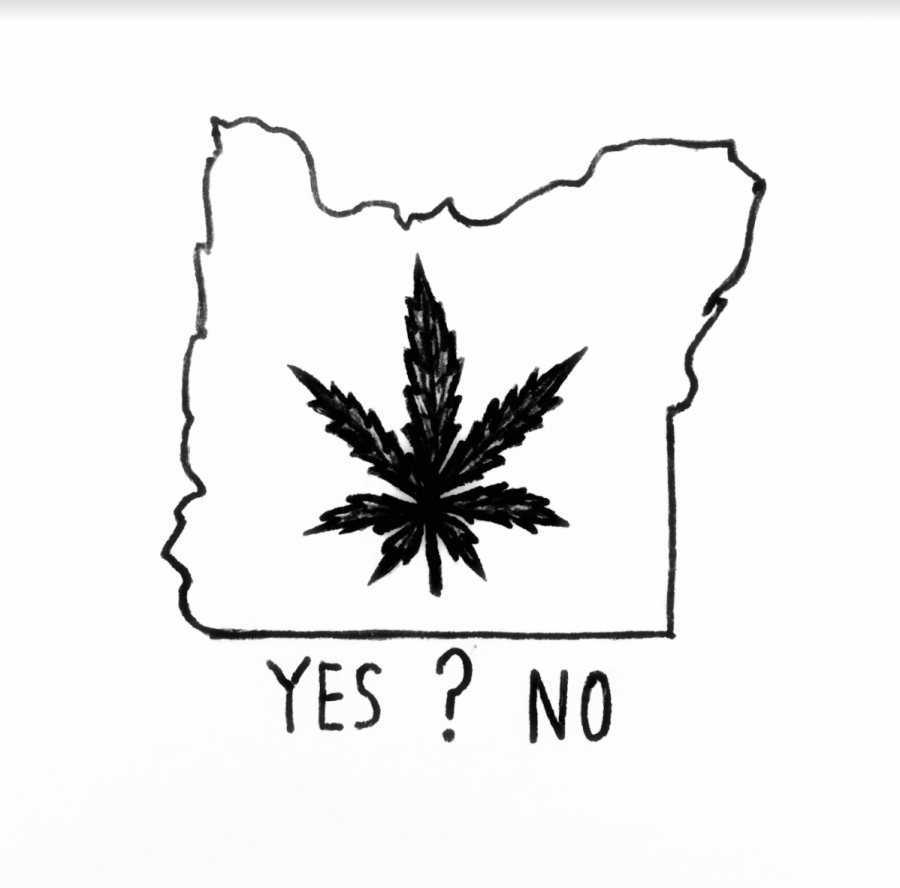Oregon’s Measure 110 Paves the Way for the Fight Against the War on Drugs
November 30, 2020
The 2020 election brought a plethora of fundamental change to America, but the new president might’ve been just the beginning.
On Orgeon’s ballot this year was the controversial Measure 110 that reduced laws and charges surrounding drug possession, and implemented statewide addiction treatment programs in an attempt to destigmatize drug addiction. This movement was understandably scary for people in Oregon, and even across the country: if we’re constantly being told that drugs are bad, why are they suddenly legal? The pushback surrounding this new bill stems from decades of stigma that has been legitimized and fueled by media and federal legislation. Because of this, people’s understanding of what this bill means and to what extent the law applies isn’t always correct.
While Oregon may be the first state to take such drastic steps towards total drug reform, the concept is somewhat familiar. The term “decriminalization” has been on many state governments’ radars since the rise of the nationwide movement to decriminalize marijuana just a few years ago. While it is a big change, it is not the same as legalization, in which any and all legal prohibitions are removed. Under Oregon’s new law, the manufacturing and distribution of drugs remains a federal criminal offence—only drug possession is covered under Measure 110, and even that doesn’t go completely unpunished. Small amounts—less than two grams—of all drugs, including methamphetamine, cocaine, heroin, oxycodone, and “magic mushrooms,” would now be seen as a civil violation—along the same lines as a traffic ticket. All this aligns with most other drug decriminalization legislation, except for the fact that this time, it extends beyond just marijuana.
The new law’s original intentions were to take power away from drug cartels and give the federal government more control and cognizance of the domestic drug trade. Supporters of the law also hoped it would lower the massive U.S. prison population, all the while bringing people to see addiction as the public health issue it is, rather than a criminal offence. Until recently, this has seemed far out of reach. However, Measure 110 seems to be the first step towards some of this much needed substantial change. Not only has Oregon made an attempt at reducing criminal sentences, the new law also includes rules surrounding governmental spending. The measure requires that at least 57 million dollars a year from marijuana tax revenue be allocated to state grant funding for addiction treatment, which includes the implementation of dozens of addiction recovery centers aimed at connecting people to peer support, health care, and case management resources.
Communities of color have continued to suffer the consequences of previous drug reform attempts, only partly shown by the stark differences in prison populations; however, Measure 110 shows early promise to take a different and less harmful approach that includes less prosecution and more medical aid. Before the big win in the first week of November, the bill had already gained support from Black, Latinx, and immigrant communities, as well as the backing of the NAACP and multiple physician and medical groups.
The measure comes almost 50 years after the infamous War on Drugs, started by the Nixon administration in the 1970s and eventually escalated by Ronald Reagan. It pushed an agenda that strengthened the correlation between drug use and criminality, and resulted in increases to the already inflated U.S. incarceration rates. After disastrous outcomes that saw no improvement in drug related crimes and overdoses, it seemed that the winner of the war on drugs was, well, the drugs. However, later administrations saw great success in decriminalization, and eventually legalization of medical and recreational marijuana, which Oregon hopes to extend to other drugs.
Thanks to the disastrous call to war some fifty years ago, drug reform will always be controversial. Just recently, Vice President-Elect Kamala Harris has been criticized for her history as a prosecutor in California, where she advocated for multiple programs pushing for increased prosecution for minor drug crimes. In truth, the fear of drugs that has been ingrained in people and in federal legislation stems from efforts that have nothing to do with improving public health, and more to do with pushing a racially charged agenda from the 1960s. Orgeon’s law will not immediately solve these problems—even with the laws we’ve already passed, the country hasn’t seen the improvement of incarceration rates that were anticipated with the legalization of marijuana—but hopefully, it will begin to change America’s outlook on drugs and where the real issues lie.










